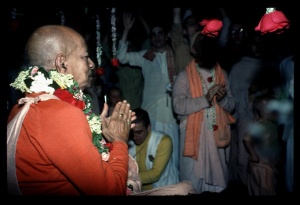CC Adi 17.114: Difference between revisions
m (1 revision(s)) |
No edit summary |
||
| Line 1: | Line 1: | ||
{{ | [[Category:Sri Caitanya-caritamrta - Adi-lila Chapter 17|C114]] | ||
<div style="float:left">'''[[Sri Caitanya-caritamrta|Śrī Caitanya-caritāmṛta]] - [[CC Adi|Ādi-līlā]] - [[CC Adi 17|Chapter 17: The Pastimes of Lord Caitanya Mahāprabhu in His Youth]]'''</div> | |||
<div style="float:right">[[File:Go-previous.png|link=CC Adi 17.113|Ādi-līlā 17.113]] '''[[CC Adi 17.113|Ādi-līlā 17.113]] - [[CC Adi 17.115|Ādi-līlā 17.115]]''' [[File:Go-next.png|link=CC Adi 17.115|Ādi-līlā 17.115]]</div> | |||
{{CompareVersions|CC|Adi 17.114|CC 1975|CC 1996}} | |||
{{RandomImage}} | |||
==== TEXT 114 ==== | ==== TEXT 114 ==== | ||
<div | <div class="verse"> | ||
ye hao, se hao tumi, tomāke namaskāra | :ye hao, se hao tumi, tomāke namaskāra | ||
prabhu tāre prema diyā kaila puraskāra | :prabhu tāre prema diyā kaila puraskāra | ||
</div> | </div> | ||
| Line 12: | Line 16: | ||
==== SYNONYMS ==== | ==== SYNONYMS ==== | ||
<div | <div class="synonyms"> | ||
ye | ''ye hao''—whatever You are; ''se hao tumi''—whatever You may be; ''tomāke—''unto You; ''namaskāra''—my obeisances; ''prabhu''—the Lord; ''tāre''—unto him; ''prema''—love of Godhead; ''diyā''—delivered; ''kaila''—did; ''puraskāra''—honor. | ||
</div> | </div> | ||
| Line 19: | Line 23: | ||
==== TRANSLATION ==== | ==== TRANSLATION ==== | ||
<div | <div class="translation"> | ||
The all-knowing astrologer concluded, “Whatever You may be or whoever You may be, I offer my respectful obeisances unto You!” By His causeless mercy, the Lord then gave him love of Godhead, thus rewarding him for his service. | The all-knowing astrologer concluded, “Whatever You may be or whoever You may be, I offer my respectful obeisances unto You!” By His causeless mercy, the Lord then gave him love of Godhead, thus rewarding him for his service. | ||
</div> | </div> | ||
| Line 26: | Line 30: | ||
==== PURPORT ==== | ==== PURPORT ==== | ||
<div | <div class="purport"> | ||
The incident of Lord Caitanya’s meeting the all-knowing astrologer is not mentioned in the Caitanya-bhāgavata, but we cannot therefore say that it did not take place. On the contrary, we must accept the statement of Kṛṣṇadāsa Kavirāja Gosvāmī that whatever the Caitanya-bhāgavata did not mention he has especially mentioned in the Caitanya-caritāmṛta. | The incident of Lord Caitanya’s meeting the all-knowing astrologer is not mentioned in the ''Caitanya-bhāgavata'', but we cannot therefore say that it did not take place. On the contrary, we must accept the statement of Kṛṣṇadāsa Kavirāja Gosvāmī that whatever the ''Caitanya-bhāgavata'' did not mention he has especially mentioned in the ''Caitanya-caritāmṛta.'' | ||
</div> | </div> | ||
__NOTOC__ | |||
<div style="float:right; clear:both;">[[File:Go-previous.png|link=CC Adi 17.113|Ādi-līlā 17.113]] '''[[CC Adi 17.113|Ādi-līlā 17.113]] - [[CC Adi 17.115|Ādi-līlā 17.115]]''' [[File:Go-next.png|link=CC Adi 17.115|Ādi-līlā 17.115]]</div> | |||
__NOTOC__ | |||
__NOEDITSECTION__ | |||
Revision as of 17:25, 23 July 2021

A.C. Bhaktivedanta Swami Prabhupada
TEXT 114
- ye hao, se hao tumi, tomāke namaskāra
- prabhu tāre prema diyā kaila puraskāra
SYNONYMS
ye hao—whatever You are; se hao tumi—whatever You may be; tomāke—unto You; namaskāra—my obeisances; prabhu—the Lord; tāre—unto him; prema—love of Godhead; diyā—delivered; kaila—did; puraskāra—honor.
TRANSLATION
The all-knowing astrologer concluded, “Whatever You may be or whoever You may be, I offer my respectful obeisances unto You!” By His causeless mercy, the Lord then gave him love of Godhead, thus rewarding him for his service.
PURPORT
The incident of Lord Caitanya’s meeting the all-knowing astrologer is not mentioned in the Caitanya-bhāgavata, but we cannot therefore say that it did not take place. On the contrary, we must accept the statement of Kṛṣṇadāsa Kavirāja Gosvāmī that whatever the Caitanya-bhāgavata did not mention he has especially mentioned in the Caitanya-caritāmṛta.